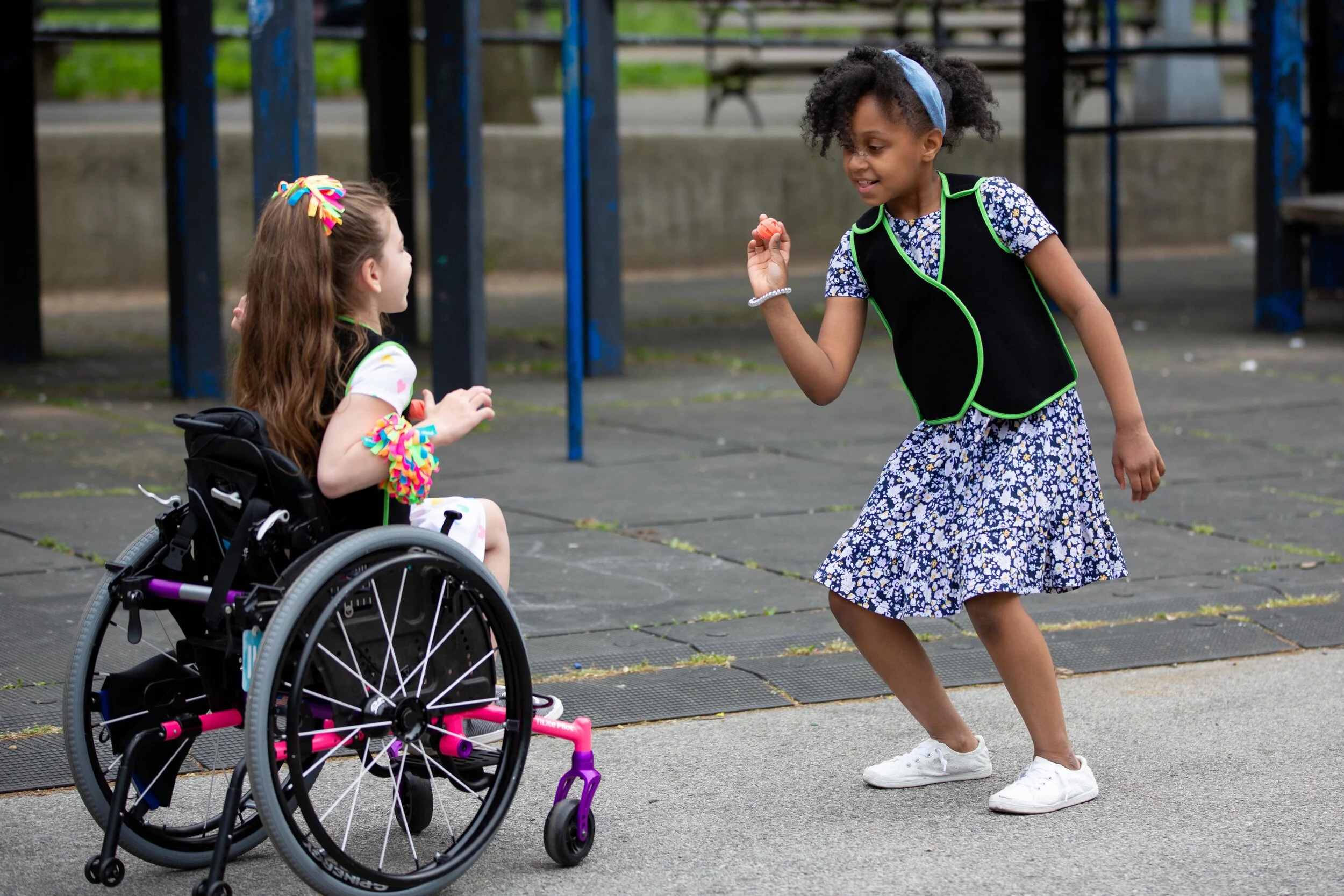
our pillars
powered by
awareness
Self-determination is essential to the healthy development and fulfillment of every individual. At POWERED BY INCLUSION, we constantly strive to create agency for individuals with disabilities through autonomy, competence and inter-relatedness. This process starts in childhood, with the process of play:
“There is a growing body of evidence supporting the many connections between cognitive competence and high-quality pretend play. If children lack opportunities to experience such play, their long-term capacities related to metacognition, problem solving, and social cognition, as well as to academic areas such as literacy, mathematics, and science, may be diminished. These complex and multidimensional skills involving many areas of the brain are most likely to thrive in an atmosphere rich in high-quality pretend play.”
- Dr. Doris Bergen, Journal of Early Childhood Research and Practice.
Recognizing the imperative for play opportunities for all children, Powered by Inclusion seeks to make those opportunities accessible to children with a broad range of adaptive needs. POWERED BY INCLUSION makes play products and experiences inclusive, so that all children can enjoy the developmental advantages of creative play. POWERED BY INCLUSION builds understanding among parents, educators, designers, etc. of the power and opportunity provided by inclusive play.
0
public school children in the US have a disability
0
of the school population
0
the number in 1976
powered by
Inclusive Programs
Separate but equal has never been inclusive.
“In a truly inclusive setting, every person feels safe and has a sense of belonging.” - Opensocietyfoundations.org
Research shows that children with language, cognitive, physical, and developmental disabilities develop through play just as their typically-developing counterparts do. If children lack opportunities to experience play, their long-term capacities related to metacognition, problem solving, and social cognition, as well as to academic areas such as literacy, mathematics, and science, may be diminished. This exclusion, started in childhood, has profound and lasting impact throughout a person’s life.¹
In addition, numerous studies have demonstrated that children, including those with high incidence disabilities, perform and learn better when fully integrated into an able-bodied peer group when compared to those in traditional segregated settings.²
POWERED BY INCLUSION creates activities and programming for children of all abilities, so that all children can enjoy the developmental advantages of creative play. We also work to normalize disability, affording all children the richer leaning environment that is afforded by true diversity.
Current/recent programming includes:
Learning support programming for Title 1 school children through The Bridgeport Public Library
Afterschool programming to provide sensory integration activities for preschool children and to normalize disability, as activities are led by adults with disabilities
0
of school-aged children have a disability3
0
of all children enrolled in public school have a disability.4
Sources: [1] Wagner, M., Newman, L., Cameto, R., and Levine, P. (2006). The Academic Achievement and Functional Performance of Youth With Disabilities. A Report From the National Longitudinal Transition Study-2 (NLTS2). (NCSER 2006-3000). Menlo Park, CA: SRI International. [2] Xuan Bui, Carol Quirk, Selene Almazan, Michele Valenti, Maryland Coalition for Inclusive Education (mcie.org) Inclusive Education Research & Practice https://985bdc52-c4dd-40c1-b0f9-96d96b9eb561.filesusr.com/ugd/34e35e_0f6d9a16276648a2b68181b800d9e3e2.pdf .[3] https://nces.ed.gov/programs/coe/indicator_cgg.asp. [4] https://nces.ed.gov/programs/coe/indicator_cgg.asp.
powered by
Adaptive Employment
Many groups strive to improve outcomes for children, especially children with disabilities, but to what end? The opportunities for meaningful participation, to fully realize self-determination (autonomy, competence and inter-relatedness), are elusive for many adults with disabilities.
From the start, we have believed that every job at POWERED BY INCLUSION should be filled by an adult with a disability. Our workforce has always been very diverse, employing adults with developmental and learning differences, cerebral palsy, deafness, chronic fatigue syndrome, severe anxiety and autism. As with many businesses, we require a broad range of skill sets and, with the necessary supportive services and equipment, can accommodate a broad range of adaptive needs.
What we have learned is the vast and talented pool of adults with disabilities has largely been excluded from the economic advantages of meaningful employment. According to the Bureau of Labor Statistics, in February 2020, 72.3% of all employable adults with disabilities across the United States were unemployed⁶ before the pandemic. The numbers are especially grim in New York City. According to the 2018 report from the Mayor’s Office of People with Disabilities, 1 million New York City residents, or 11.2% of the population, are identified as disabled. 77% of those New Yorkers between the ages of 16 and 64 are unemployed.⁷ The lack of supported work for adults with disabilities in New York City has left many employable adults out of the workforce and has increased the burden on local subsidies.
What do we all risk losing by marginalizing adults with disabilities in our communities? Brilliance: Stephen Hawking. Temple Grandin. Ludwig von Beethoven. President Franklin Delano Roosevelt. Senator Tammy Duckworth. Judy Heumann. Albert Einstein. Countless contributions from individuals with disabilities may be forever lost, due to barriers to their participation.
0
of those children have a learning disability5
0
adults in the US have a disability8
0
of the population
0
are unemployed
Sources: [5] https://nces.ed.gov/programs/coe/indicator_cgg.asp, [6] https://www.bls.gov/news.release/disabl.nr0.htm, [7] https://www1.nyc.gov/assets/mopd/downloads/pdf/accessiblenyc-2018.pdf - It should be noted that this number reflects the US Census Bureau’s 2014 American Cities study and does not represent the full range of “disabilities,” including some neurodiversity populations. [8] https://www.cdc.gov/ncbddd/disabilityandhealth/infographic-disability-impacts-all.html#:~:text=61%20million%20adults%20in%20the,have%20some%20type%20of%20disability.
powered by
workforce development
To ensure the continued success of our employees, it is necessary to provide job preparation, job matching, job training and on-the-job supports, including social-emotional awareness training and support. The traditional, government-funded, workforce development services have proven woefully inadequate to maintaining long-term employment for a large portion of our community. Traditional workforce development programming has not had sufficient resources to provide the one-on-one support, individualized process and complex social-emotional skill-building that are necessary to assure that all adults may access and retain meaningful employment.
Our occupational therapists work to help us understand each individual’s adaptive needs. They then design an implementation program designed for that individual’s success. Finally, they provide ongoing oversight and audit to be sure that our training and support is sufficient and appropriate.
Our job coaches implement the detailed plans designed and trained by our occupational therapists.
Our behavioral psychologist considers individual needs, group dynamics and workplace norms in helping shape and guide the necessary supports to assure that our trainees and employees integrate successfully into their work environments
0
of adults with disabilities graduate high school
0
less than their non-disabled peers
0
of adults with disabilities graduate college
0
less than their non-disabled peers
powered by
Self-Determination
Self-Determination Theory (SDT) represents a broad framework for the study of human motivation and personality. SDT articulates a meta-theory for framing motivational studies, a formal theory that defines intrinsic and varied extrinsic sources of motivation, and a description of the respective roles of intrinsic and types of extrinsic motivation in cognitive and social development and in individual differences. Perhaps more importantly, SDT propositions also focus on how social and cultural factors facilitate or undermine people’s sense of volition and initiative, in addition to their well-being and the quality of their performance. Conditions supporting the individual’s experience of autonomy, competence, and relatedness are argued to foster the most volitional and high quality forms of motivation and engagement for activities, including enhanced performance, persistence, and creativity. In addition, SDT proposes that the degree to which any of these three psychological needs is unsupported or thwarted within a social context will have a robust detrimental impact on wellness in that setting.⁹
POWERED BY INCLUSION is committed to a future that supports self-determination for all individuals with disabilities. We will work tirelessly, through all means available to us, to foster dialog, understanding, opportunities, autonomy, competence and inter-relatedness. By making the advantages of self-determination available to individuals with disabilities, we all benefit from the contributions of our truly diverse community.
0
of all US households have a child with a disabilityA
0
US households have a family member with a disabilityB







